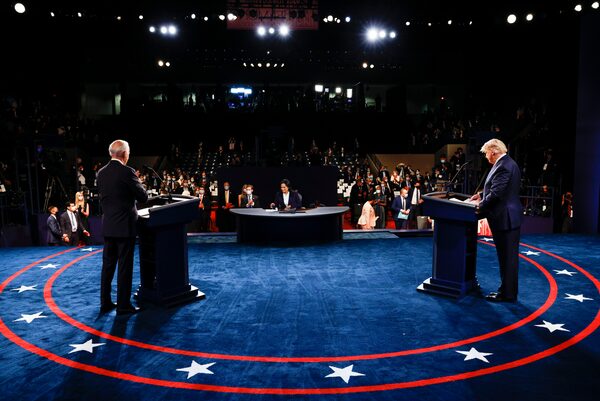
U.S. President Donald Trump and Democratic presidential nominee Joe Biden participate in the final presidential debate at Belmont University, in Nashville, Tenn., on Oct. 22, 2020.JIM BOURG/Getty Images
They argued more about each other’s family finances than about the finances of the average American family. They exchanged pre-rehearsed barbs. They repeated familiar tropes about each other. They plowed little new ground – and likely did not set in motion any new political trends, likely did not disrupt many Americans' perceptions of the two men, and likely did not substantially alter the dynamics of the election.
There have been many remarkable closing arguments in American history. There was Thaddeus Stevens in the 1868 impeachment trial of President Andrew Johnson, asserting that “nothing is so prolix as ignorance.” There was the three-time presidential candidate William Jennings Bryan in the 1925 Dayton, Tenn., judicial challenge to the teaching of evolution, speaking of “this attack upon the Christian religion.” There was Johnnie Cochran in the 1995 murder trial of O.J. Simpson, citing the size XL Artis Light black glove found at the crime site, arguing that “if it doesn’t fit, you must acquit.”
Final U.S. presidential debate 2020: Six highlights from the night
Catch up on the final presidential debate and what Globe writers had to say
In their final head-to-head confrontation before the Nov. 3 election – their final chance to have the entire country’s ears at one moment before all the votes are cast, their last opportunity to distill their case before a nationwide audience – the closing arguments of President Donald Trump and former vice-president Joe Biden didn’t remotely measure up.
Not that there were no moments of high drama and high rhetoric in a session that, unlike its predecessor, had many of the qualities of a conventional political debate. Mr. Trump said that the coronavirus, which has caused 223,000 American deaths, would “soon be gone” and asserted that a vaccine would be available within weeks. Mr. Biden said that “anyone responsible for that many deaths should not be president of the United States.” Later Mr. Trump mocked his rival for “living in a basement” and Mr. Biden said of the refusal of the President to release his income tax forms, “What are you hiding?”
Then there was Mr. Trump’s remark, “I know more about wind than you do,” and Mr. Biden’s criticism of the President in asserting that “he doesn’t understand” the dangers citizens face when they live near energy production sites.
And when the topic turned to health care, Mr. Biden said the President “hasn’t done a thing for anyone on health care,” prompting Mr. Trump to accuse the Delawarean of supporting “socialized medicine.” Those were fighting words, to be sure, but the two have fought with almost those exact same words, albeit from a distance, for months.
For many Americans, all this is a moot point; a University of Florida study indicates that about 48 million people already have voted, two-thirds of them by mail. Voters have been stable in their outlooks; more than two-thirds of those who know how they will vote decided more than a half-year ago, according to a Quinnipiac University poll released hours before the debate, with another 20 per cent saying that they decided in the last six months.
They found little on the Belmont University stage in Nashville, Tenn. – little in the two candidates' roles as prime-time superspreaders of invective and, on many occasions, merchants of exaggeration – to sway their convictions.
But in a debate with few interruptions and more civil interchanges than in the first debate – in short, a political confrontation from which Trump strategists surely came away relieved – Americans did witness real differences between the two candidates.
Twenty years ago the consumer advocate Ralph Nader dismissed Vice President Albert Gore Jr. and Governor George W. Bush as “Tweedledee and Tweedledum.” No one could plausibly make that argument after watching Thursday’s session. Mr. Trump said that immigrants detained at the southern border “are so well taken care of.” Citing the detention sites and the disclosure that officials cannot find the parents of 545 detained children, Mr. Biden said the administration policy “violates any notion of who we are as a nation.”
Even so, Americans ordinarily pay little heed to a final debate in a presidential election. Indeed, the fourth debate in the landmark 1960 series between Vice President Richard M. Nixon and Senator John F. Kennedy – conducted 60 years ago this very week – is remembered, if at all, as part of a trivia question involving the two contenders' views on the long-forgotten dispute over Quemoy and Matsu, islands off the coast of China that were emblems of Cold War conflict.
The only great mystery emerging from Thursday’s session is whether anyone will recall anything about the final presidential debate, except perhaps Mr. Trump’s claim that “I am the least racist person in this room” and Mr. Biden’s response, “He pours fuel on every single racist fire”– or maybe the President’s assertion that “I do love the environment” or Mr. Biden’s expression of astonishment, “I don’t know where he comes from.”
There may be a few undecideds remaining among American voters but there can be no hunger for another debate, nor for another few weeks of this campaign. As the 18th-century literary critic Samuel Johnson said of Paradise Lost, the 1667 epic poem, “None ever wished it longer than it is.”
U.S. President Donald Trump and Democratic challenger Joe Biden faced off in their final debate on Oct. 22 in a last-ditch effort to win over the few remaining undecided voters just 12 days before the U.S. election. Gloria Tso reports.
Reuters
Our Morning Update and Evening Update newsletters are written by Globe editors, giving you a concise summary of the day’s most important headlines. Sign up today.
 David Shribman
David Shribman